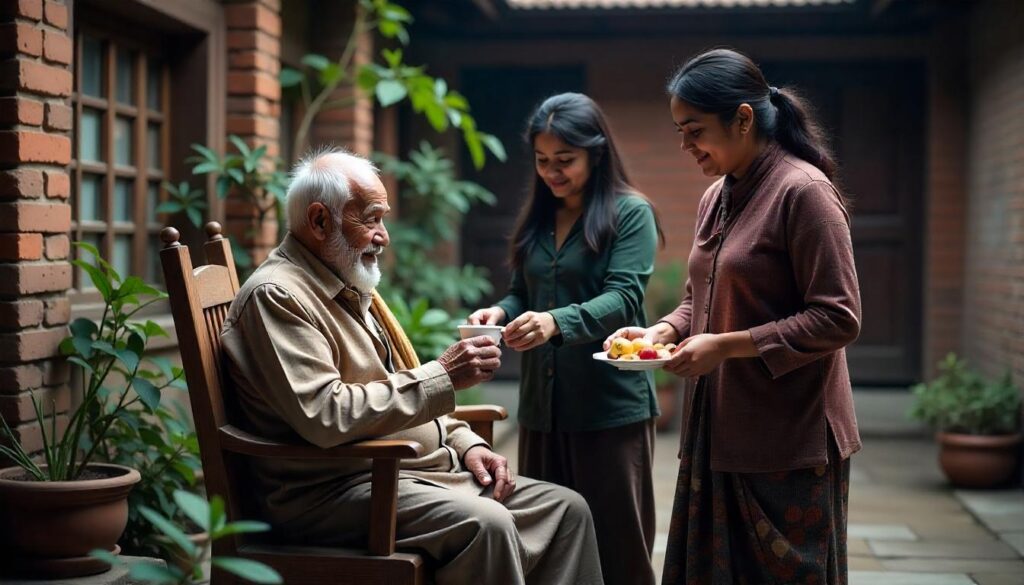Recognizing Signs Your Elderly Loved One Needs Support in Nepal
As our loved ones age, the complexities of their needs can often become a challenging landscape to navigate. In Nepal, where family bonds are deeply cherished, recognizing when an elderly family member needs support is crucial. This post will explore several signs that indicate your elderly loved one may require assistance, ensuring they’re cared for and supported adequately.
Changes in Physical Health
As people grow older, physical health becomes increasingly delicate. It’s important to observe any shifts in your loved one’s well-being.
Weight Loss or Poor Nutrition
One of the first signs of declining health can manifest in a noticeable change in weight. If your elderly loved one is losing weight rapidly or exhibiting signs of malnutrition, it could signal that they are struggling to prepare meals or are experiencing difficulties in eating.
- Often misplaced appetite
- Difficulty in grocery shopping and meal preparation
- Health issues like dental problems or swallowing difficulties
Encouraging regular meals with family can help; cooking together can not only ensure they are eating properly but can also strengthen family connections.
10 Warning Signs Your Elderly Loved One Needs Support
Noticeable Weight Loss or Poor Nutrition
Loss of appetite or forgetting to eat meals is common among elderly individuals. In Nepal, where traditional diets are rich and varied, sudden weight loss or consistently skipping meals may indicate they’re struggling with meal preparation or eating regularly.
Difficulty Managing Medications
With healthcare access improvements in major Nepali cities like Kathmandu, elderly people often take multiple medications. Signs of mismanagement include finding expired medications, confusion about dosages, or forgetting to take important medicines altogether.
Declining Personal Hygiene
A noticeable decline in personal grooming, bathing less frequently, or wearing the same clothes repeatedly can indicate physical limitations or memory issues. In Nepal’s warm climate, proper hygiene is especially important for health maintenance.
Mobility Issues or Recent Falls
Traditional Nepali homes often have stairs or elevated thresholds that can become hazardous. Signs of mobility problems include reluctance to leave home, difficulty climbing stairs, or bruises indicating recent falls.
Cognitive Decline or Memory Issues
Beyond normal aging forgetfulness, watch for consistent memory lapses, confusion during conversations, getting lost in familiar settings, or forgetting important cultural or religious practices that were once important to them.
Social Withdrawal
In Nepal’s community-oriented culture, becoming isolated from social gatherings, temples, or family events may indicate physical limitations, depression, or cognitive issues that require attention.
Household Maintenance Issues
Unexplained home disrepair, piling dishes, neglected garden, or difficulty maintaining traditional household routines may signal they’re struggling with daily tasks.
Financial Mismanagement
Watch for unpaid bills, confusion about money, unusual purchases, or difficulty handling routine financial matters, especially if they were previously competent with finances.
Changes in Mood or Behavior
Increased irritability, signs of depression, anxiety, or significant personality changes may indicate underlying health issues or struggles with daily living that need professional attention.
Difficulty Managing Chronic Health Conditions
Nepal’s healthcare system requires careful navigation. If your loved one is missing appointments, showing worsening symptoms of existing conditions, or unable to follow treatment plans, they may need support.

Understanding Care Options in Nepal’s Context
When you notice these signs, it’s important to consider the care options available in Nepal. The decision between home care and assisted living facilities depends on various factors including the level of care needed, financial resources, and family circumstances.
Cultural Considerations in Nepal
In Nepal, there may be hesitation or stigma associated with seeking outside help for elderly care. Many families consider it their duty to personally care for elderly relatives. At Carepii Nepal, we understand these cultural sensitivities and work to provide care solutions that honor traditional values while meeting modern needs. Our approach incorporates respect for Nepali customs, languages, religious practices, and dietary preferences.
Conclusion
Navigating the complexities of elderly care requires awareness and compassion. By recognizing these signs — physical health changes, behavioral shifts, challenges with daily living, and emotional struggles — you not only ensure your loved one maintains a higher quality of life, but you also reinforce the valuable family bonds that can sometimes feel strained during these transitions.
Being proactive and attentive to these signs can make a world of difference in the lives of your elderly family members, ensuring they feel supported and loved every step of the way.




